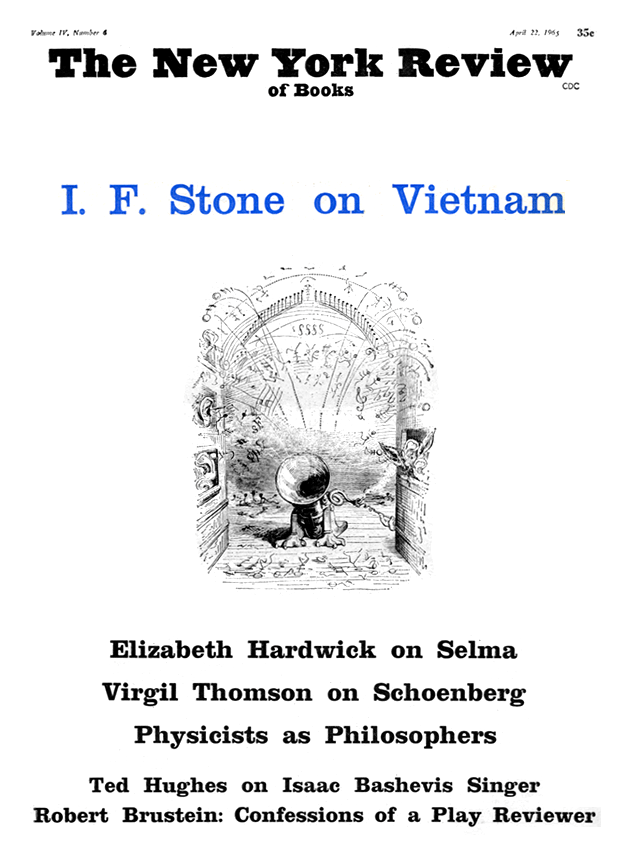This is a dull book but for the most part worthy, not to say pious. A conscientious attempt has been made to trace the life and career of Yvette Guilbert from her childhood in the Parisian gutter (or not far removed from it), through her glittering supremacy as a fin de siècle diseuse, on into the years of waning prestige and cultural pretension, and so to her last days, harassed and impecunious, in the bleak Provence of 1944.
The trouble is that the material is simply too thin to fill out a book of 380 pages. The early struggles read well enough: the elusive friendship with Zidler the circus impresario, the period of training (did Zidler pay?), the cruel rejections both in Paris and the provinces, the realization of a new and unique style, the brilliant intuition that Xanrof’s street ballads would make ideal material, the subsequent conquest of the capital—through all this, though the story is familiar in kind and the narrative style limp, our interest is kept and our sympathies engaged. But thereafter…well, there is a certain amount of period stuff, and characters like Lautrec and La Goulue are big enough to survive even the clichés of Chipman and Knapp; there is a lot about money, always an amusing topic; the last drop is squeezed out of the heroine’s acquaintance with the Prince of Wales; and both Duse and Bernhardt are good to keep things running for a while when other fuel is low. But sooner or later it is necessary to come back to the career and personality of Yvette herself; and when this happens, I for one am bored and alienated by turn.
For consider. Here was a woman with a spikey, sophisticated talent for singing smutty songs in café-concerts, and very nice too. But not exactly a foundation for the greatness for which Yvette was ambitious; so where should she go from there? Her answer, which provides Knapp and Chipman with the tenuous substance for the second half of this book, was culture. She would become a student, she would refer to learned men, she would do research; she would investigate and adapt for performance French ballads of the seventeenth, the sixteenth, the fifteenth centuries, right back to the Latin doggerel of the wandering scholars. Audiences might prefer Xanrof, but like it or not—and were not the Germans at least responsive?—they were going to get Poetry with a capital P. True, even the Germans had found “La Vie du Christ,” a program of chansons devoted to a major cultural occurence in Palestine, rather heavy going, and the Americans on her last visit had been less than friendly; but to be cultured, as to be beautiful, it was necessary to suffer, so suffer she would.
Poor, perverse Yvette. She had determination; more, she had courage. She faced prodigious illnesses, she faced mutinous audiences, she even faced loss of money—all in the name of Art. The only thing she would not face was the plain truth that a minor talent, however, fashionable, does not constitute artistic genius. It is this deliberate and unctuous self-deception, in which she is joined and supported by the authors of this biography, that makes one discount her bravery and insist on her absurdity. She refused to understand her limits: for was not her soul limitless? To make quite sure she wrote to Dr. Freud, whom she had heard was a leading authority on the matter: would he kindly explain the nature of her art and its relation to her inner being? The doctor, flattered but rather puzzled, opined that Yvette’s art was her suppressions coming out. This, of course, would not do at all: her art was instinctive, she instructed him by return of post; “my sensitiveness, my painter’s eye, help me to divine everything about what I do not know…” (italics hers). This settled, it only remained to communicate her divinations to her “beloved Parisian audience.” But alas, her beloved Parisian audience wanted only one thing: it wanted her to go back to smut.
And quite rightly. Here was a music-hall performer of great skill, charm, and wit. So let us be grateful for her, let us send her flowers, cheer her carriage, and pay her phenomenal fees, but let us not, for the love of heaven, start getting heavy and intense, let us never encourage her to take herself too seriously. This, as I have already remarked, is just what out two authors have done. Regretfully conceding that many of their heroine’s later ventures left critics skeptical and audiences howling for their money back, they have accepted the “cultural” side of Yvette at her own evaluation and gone banco on her “art.”
This, then, is the old story of the actor who gets out of hand. Not content with being good at his own job, he must needs be dramatist, producer, critic, and even philosopher as well. He is terrified, you see, of being dismissed as a mere entertainer; it simply isn’t fair; why can’t he be an intellectual or a writer like all these other crumbs at the party? What’s the good of being paid all this money, for Christ’s sake, if he doesn’t get proper respect?
Advertisement
So it was with Yvette. She grew to hate the black gloves and suggestive postures which had made her famous in the Paris of the Nineties. She was made for higher things. No more dirty little ditties about gigolos and poufs—unless, of course, they were over two hundred years old. She forgot she had started out by actually amusing people. She was an artist now, licensed to bore, a license upon which her two biographers have most heavily presumed.
This Issue
April 22, 1965


